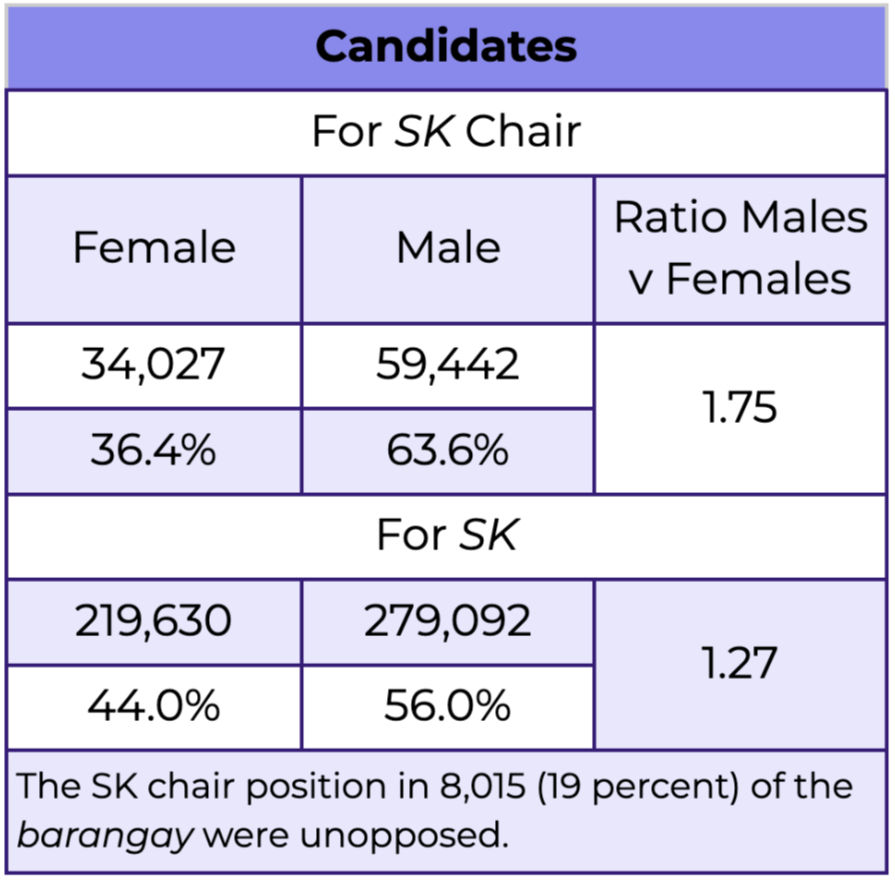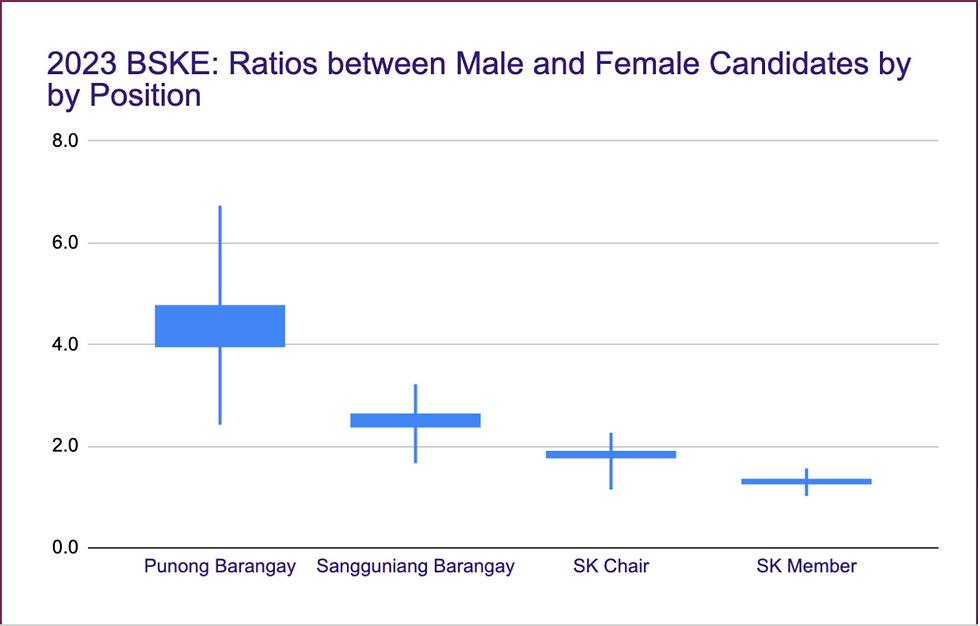
Females comprised 43 percent of the candidates in the Sangguniang Kabataan (SK or village youth council) elections last month. This was reported by the Commission on Elections which oversaw the elections of both the SK and barangay councils on 30 October 2023. Each of the 42,001 barangay (village) nationwide has a Sangguniang Kabataan composed of one chairperson and seven council members who are elected by voters aged between 15 and 30 years.
In contrast, much fewer women vied for positions in the barangay council: only 21 percent of candidates for punong barangay (village chief) and 30 percent for barangay councilor.

Even less women ran in previous elections. For example, in the general elections in May 2022, females comprised only 19 percent of all candidates vying for various national and local positions, and only 23 percent of that number succeeded in being elected.
The number of female candidates has not changed significantly in the four elections since 2010, when women comprised just 17 percent of candidates. The relatively high number of female candidates for the SK is therefore groundbreaking.
Ideally, there should be parity in the number of female and male candidates. However, this might not be enough to ensure that there is gender balance in the composition of the SK. Using two ballots, one for casting a vote for female candidates and one for male candidates, is a better guarantee of parity. This assumes, of course, that there are at least four female and male candidates to choose from.
A study (for publication) by the Democratic Insights Group in mid-2023 found that women encounter various challenges when they enter the world of politics. The most formidable one is stereotyping and societal restrictions that confines women to the house or familial duties. Moreover, many women themselves are generally uncomfortable with the current political culture, which is dirty, corrupt, expensive, and exclusive. Those who are undeterred face discrimination: they are confronted with misogynistic behavior and semiotic violence, and their electability is considered low.
Women’s representation in politics needs to be increased; after all, they comprise half of the population. Electing or appointing more women to government positions is not simply about equity or empowerment. The whole of society benefits from the perspectives and brand of leadership that women bring to governance.
In Why Women in Politics, the National Democratic Institute asserts that the participation of women will result in tangible gains for democracy, including greater responsiveness to citizen needs, increased cooperation across party and ethnic lines, and more sustainable peace. Their engagement will advance gender equality and affect both the range of policy issues that get considered and the types of solutions that are proposed. As more women are elected to office, there is an increase in policy making that emphasizes quality of life and reflects the priorities of families, women, and ethnic and racial minorities.


Does the comparatively higher number of female candidates in the SK election give us reason to hope for more political participation and engagement of women in the future?

The answer would be yes, if the women elected see being in the SK as value-adding and a rich training ground for further political engagement. Over time, they could take that experience to larger responsibilities such as governing a town, city or province, or joining the legislative bodies at the local or national level. Voters, in turn, could become more aware of and appreciate the value of women in politics. This would motivate political groups and parties to deliberately increase the number of women in their ranks and endorse them as candidates.
But the answer would be no, if running for elections continues to be expensive, discriminatory, divisive, and averse to women. If the SK continues to be an extension of political control of the dominant, powerful, and monied, then women would prefer not to join this arena. If the activities of the SK are restricted to holding local sport events, entertainment activities, or beauty pageants, then those who are serious in learning about politics and governance would withdraw from engaging through the SK.
Philippine society should take stock of the fact that more and more young women are showing interest in the SK. Let’s not waste this opportunity, and instead carry this on to full momentum. Let’s nurture women for deeper and more meaningful political engagement that integrates their perspectives for creating a more compassionate society and shaping the future of the nation.

Comments